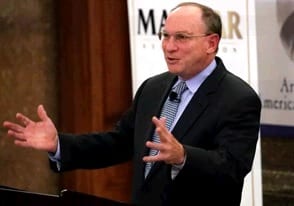
January 29, 2018
Amid deportations, SJC’s chief justice pleads for $5m hike in funding for civil legal aid
By Travis Andersen GLOBE STAFF JANUARY 25, 2018
The chief justice of the state’s highest court made an impassioned plea Thursday for a $5 million increase in public funding for civil legal aid for poor Massachusetts residents, including undocumented immigrants facing possible deportation and the severing of their families.
Speaking at the State House, Chief Justice Ralph D. Gants of the Supreme Judicial Court said raising the yearly budget allocation for indigent civil legal aid, to $23 million from $18 million, is vital amid the threat of deportation faced by thousands of state residents from Haiti, El Salvador, and Honduras who recently lost protection under the federal Temporary Protected Status, or TPS, program.
“Why $5 million more than last year? Last year, Elsa, a 45-year-old TPS holder from El Salvador who cleans Boston offices from 5 p.m. to 2 a.m., and who takes care of her two sons, both US citizens, during the rest of her waking hours, was not faced with being forced to return to El Salvador and to leave her children,” Gants said.
Last year, he continued, a 16-year-old aspiring architect who’s a US citizen with TPS parents “did not have to worry that she might have to drop out of high school to support her younger sisters after her parents are deported.”
And last year, Gants said, “Valeria, a DACA ‘Dreamer’ who is a sophomore at Northeastern University and has lived in this country since she was 7, did not feel betrayed by the country she calls home.”
Gants spoke during the 19th annual Walk to the Hill for Civil Legal Aid, sponsored by the Equal Justice Coalition, an advocacy group for legal aid recipients and attorneys.
The coalition says approximately 880,000 state residents have incomes at or below 125 percent of the federal poverty level, making them eligible for civil legal aid attorneys who can help with an array of issues, including unlawful eviction or home foreclosure, immigration proceedings, veterans’ benefits, and escaping domestic violence.
Gants said during his brief remarks that legal aid programs currently must turn away two-thirds of eligible clients because of staffing shortages.
“It has never been more important for our brothers and sisters who are poor, undocumented, or displaced to have access to attorneys who can enforce and defend their rights, articulate their claims and defenses, and advocate their cause,” Gants said. “Thank you for helping our legislators demonstrate the greatness of this Commonwealth by empowering our most vulnerable residents through the advocacy of civil legal aid.”
The state established the Massachusetts Legal Assistance Corporation in 1983 to provide representation for indigent people in noncriminal matters, and it’s currently the largest funding source for civil legal aid programs in the state, according to its website.
Governor Charlie Baker’s proposed budget for the coming fiscal year includes $18.18 million for civil legal aid, an increase of $180,000 from the current fiscal year, the corporation said Wednesday in a statement.
“We are pleased with Governor Baker’s recognition of the role civil legal aid funding plays in promoting equal access to justice for low-income residents of the Commonwealth,” said Lonnie Powers, the corporation’s executive director, in the release. “Through civil legal assistance, some of the Commonwealth’s most vulnerable residents avoid homelessness and unemployment, gain access to health care and veterans’ services, receive a quality education, and escape domestic violence. Currently, civil legal aid programs around the state turn away approximately 65 percent of eligible residents who seek services — nearly 45,000 people each year.”
Travis Andersen can be reached at travis.andersen@globe.com.

















































